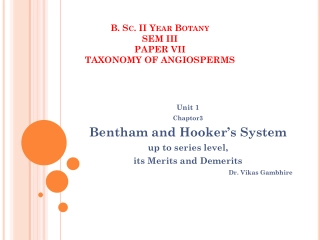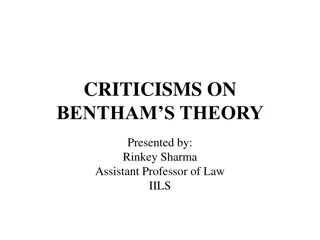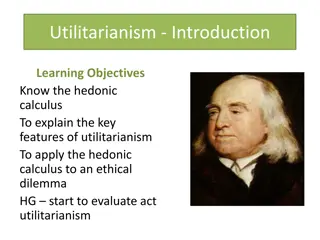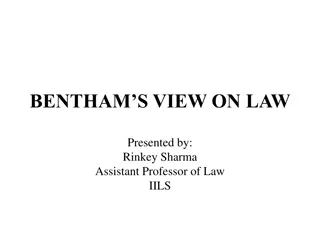Understanding Bentham's Utilitarianism Theory
Jeremy Bentham, often considered the father of Analytical School of Jurisprudence, introduced Utilitarianism as a guiding principle for law. According to Bentham, the purpose of law is to maximize the overall happiness and minimize pain for the greatest number of people. He developed the concept of Hedonistic Calculus to scientifically calculate pleasure and pain based on seven criteria. Bentham believed that legislation must aim to create a society where laws promote the greatest happiness for the majority.
Download Presentation

Please find below an Image/Link to download the presentation.
The content on the website is provided AS IS for your information and personal use only. It may not be sold, licensed, or shared on other websites without obtaining consent from the author. Download presentation by click this link. If you encounter any issues during the download, it is possible that the publisher has removed the file from their server.
E N D
Presentation Transcript
BENTHAMS THEORY OF UTILITARIANISM Presented by: Rinkey Sharma Assistant Professor of Law IILS
INTRODUCTION Jeremy Jurisprudence. Bentham should be considered as the father of Analytical school of jurisprudence because his work Of Law in General was written in 1782 but was published only in 1945 as The Limits of Jurisprudence Defined and thereafter its revised version was published in 1970 i.e, by that time Austin s book titled The Province of Jurisprudence Determined was already published and it was published in 1832. Bentham was a life long reformer of law and he believed that no reform of substantive law could be brought about without a reform of its form and structure. A thoroughly scientific conceptual framework was prelude to reform. He is regarded as Newton of Law by Lloyd. Bentham is the founder of Analytical School of
BENTHAMS UTILITARIANISM He started his theory with criticizing the concept of naturalist. According to Naturalist, the guiding principle behind law is Moral. But according to Bentham, the guiding principle behind law is utility. Principle of utility is defined as tendency of a thing to create happiness or to prevent evil, pain, unhappiness.
According to him, consequences of good or bad is pleasure and pain respectively. According to him, the proper end of every law is the promotion of the greatest happiness of the greatest number. According to him, nature has places mankind under governance of two masters i.e., Pleasure and Pain. We owe them all our ideas; we refer to them all our determination of law. judgments and all
According to him, the law which is giving pleasure to great number is a good law and law which is giving pain to large people are bad law. Hence, he said that the good or evil of an action should be measured by the quality of pain and pleasure from it.
HEDONISTICS CALCULUS According scientifically calculated according to the following seven criteria. This is known as Hedonistic Calculus. The seven criteria are as follows: 1. Intensity or how intense is it. 2. Duration or how long it lasts. 3. Certainty or how probable it is. 4. Propinquity or how soon will the expected effect will become evident. 5. Fecundity or the probability of leading to further pleasure. 6. Purity or how free from pain it is. 7. Extent or how widely it covers. to Bentham, pleasure and pain can be
According to him, the duty of legislation is to create a society with optimum pleasure and minimum pain. According to Bentham, the happiness of the society can be attained by attaining four major goals: 1. Subsistence. 2. Abundance 3. Equality 4. Security for the citizens. Thus, for Bentham, pleasure and pain were the ultimate standards on which a law was to be judged. This theory of Bentham is known as Utilitarianism.


